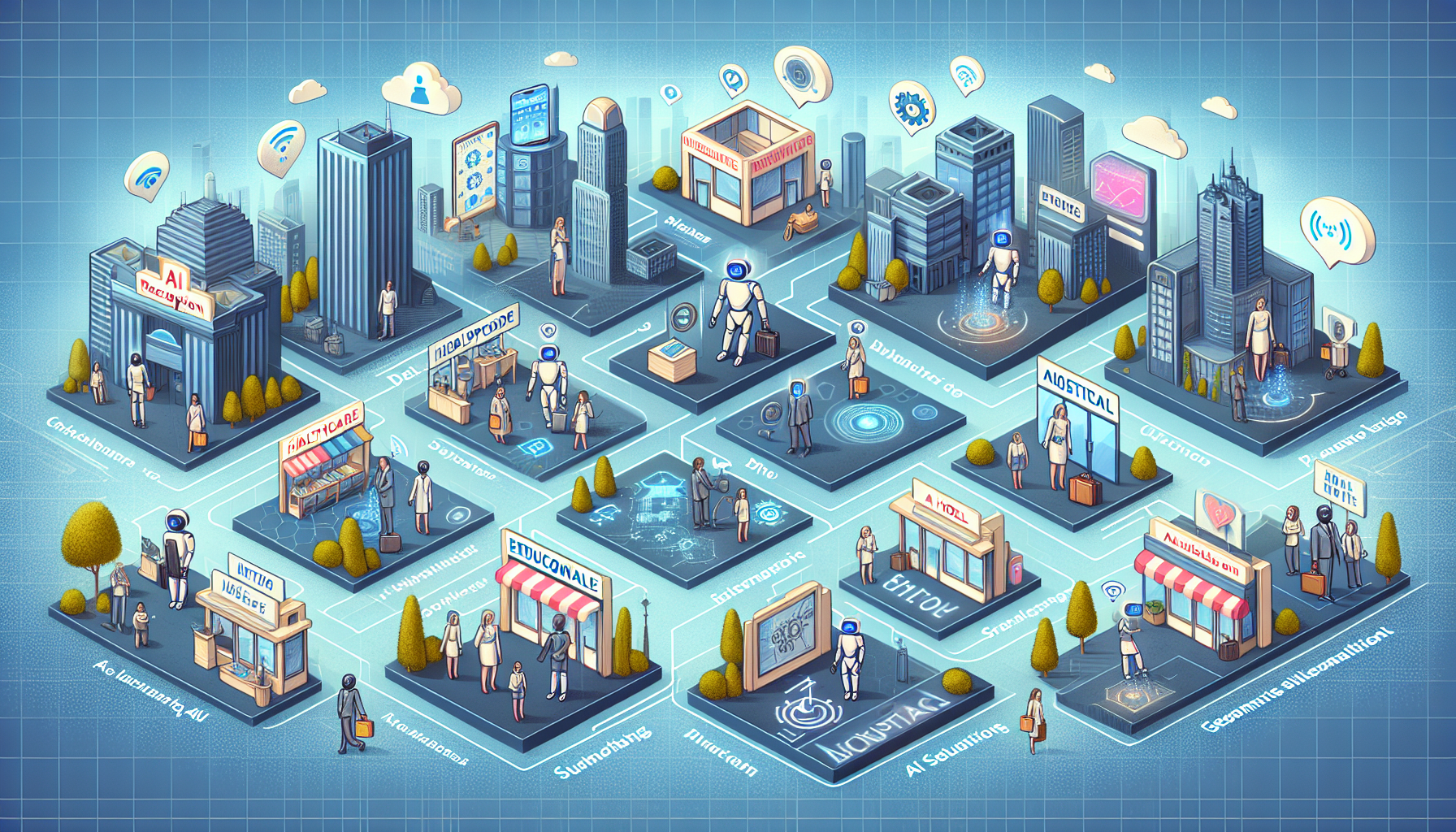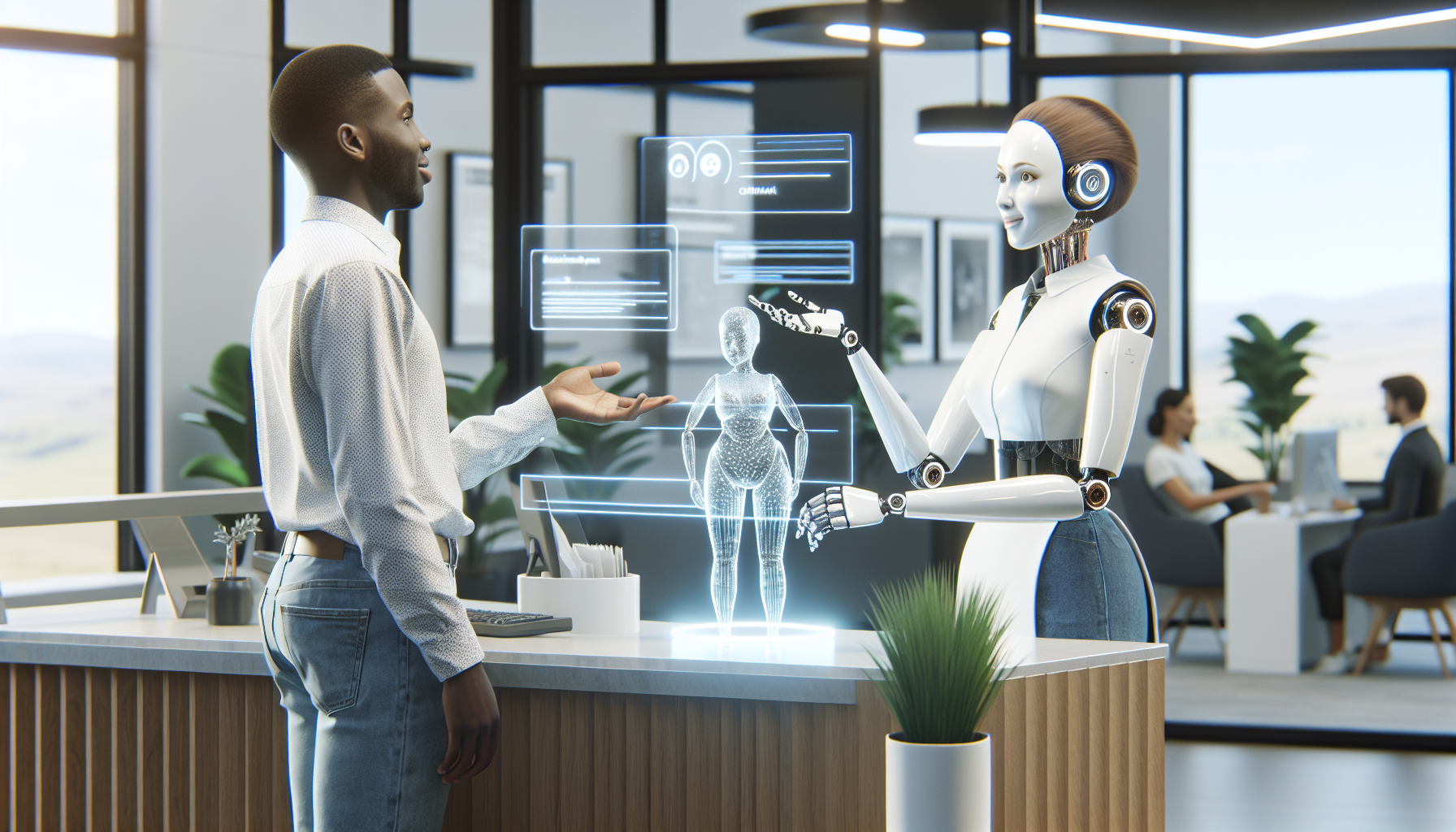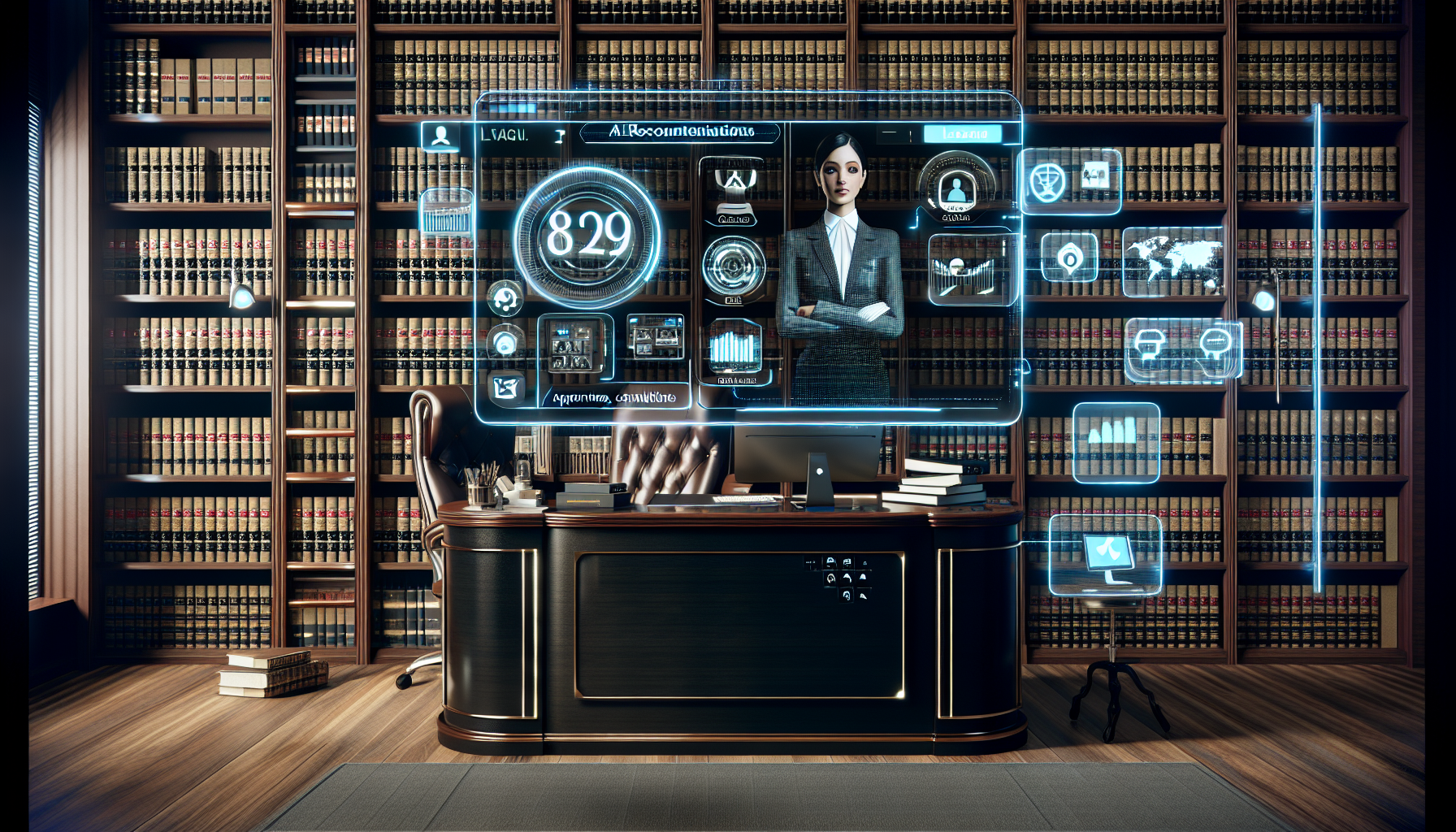
Welcome to the new era of corporate digitization, driven by the advent of AI Receptionists. Reimagining traditional customer service roles, AI receptionist technology integrates artificial intelligence into everyday customer interactions, enhancing the customer experience and streamlining business operations. The tech industry is keenly focused on designing sophisticated AI systems that can take on receptionist duties, which have historically been highly manual and time-consuming. In lighting up this pathway, we unlock unparalleled opportunities across a breadth of sectors waiting for disruption.

Central to AI receptionist capabilities are the remarkable automation features. These systems can handle tasks such as answering calls, booking appointments, and directing customer inquiries, all while maintaining an interactive, human-like communication style. By implementing an AI receptionist into business operations, companies can effectively streamline their customer communication process, enhance customer satisfaction, and lighten the workload of their human staff.
Moreover, the growing popularity of white label reseller programs are making AI receptionist solutions more accessible than ever. In these programs, companies can purchase the technology and rebrand it as their own, providing a cost-efficient method to integrate AI in customer service settings without the need for extensive technical knowledge or sizable investments.
As we continue to leverage advances in AI and machine learning, the potential applications of AI receptionists are rapidly expanding, making a string of industries ripe for disruption. From healthcare to hospitality, the impacts are far-reaching. In the following sections, we’ll delve into the “10 Industries Ripe for AI Receptionist Disruption: Your Next Big Market”, elaborating on the opportunities this technology offers in each sector.
```In a radically digitising world, the healthcare sector is ripe for an innovative disruption - courtesy of AI Receptionists. AI-powered reception solutions have the potential to revolutionize patient communication, alleviating some of the administrative burdens currently shouldered by healthcare providers and enhancing overall efficiency.
The first area that AI receptionists can transform is appointment management. A significant portion of administrative tasks in healthcare involves the scheduling, rescheduling, and managing of patient appointments, a process that can be laborious and time-consuming. AI receptionists like Clara are providing an efficacious solution by automating these tasks. These AI solutions can manage calendars, send reminders, and even reschedule missed appointments, thereby freeing healthcare staff to focus on more crucial tasks.
Beyond scheduling, AI receptionists serve as efficient interfaces for handling patient inquiries. Inquiries about services, costs, and insurances can be adequately handled by AI. Bots like Knack use machine learning to answer questions accurately, steer patients to appropriate resources, and even direct them to human representatives when necessary. Communication efficiency in the healthcare industry can be greatly improved with such an intelligent assistant.
Moreover, AI receptionists can aid in maintaining communication efficiency by tracking and sending relevant information to patients, following up on treatment plans, and coordinating with other health professionals. With AI, healthcare providers can seamlessly bridge the communication gap between doctors, patients, and other stakeholders. Leveraging AI in healthcare communication can lead to better patient management and, ultimately, improved health outcomes.
In conclusion, the integration of AI receptionists in healthcare is not just a prospective trend, but a proactive step towards improving the quality of patient communication. This is a disruptive market waiting to be extensively explored. Providers who strategically embrace this technology may gain a significant advantage in this ever-competitive field.
The legal services industry is a space where the need for precision, efficiency, and confidentiality cannot be overstated. With the everyday operations of law firms encompassing numerous parallel tasks including intricate scheduling, client interactions, and handling sensitive information, embracing modern technology solutions is not just a complementary option, but a necessity. In this regard, the contributions of AI receptionists, which incorporate attributes such as high efficiency and the ability to manage information with superior privacy, are pivotal.

AI receptionists can play transformative roles in the daily dynamics of legal firms and attorneys. These intelligent systems are capable of handling essential administrative tasks with unrivaled efficiency, tackling complex scheduling responsibilities, making precise reminders, and ensuring no critical appointments or deadlines are missed. They do not just improve efficiency; they redefine it.
Client service is another domain where the impact of AI receptionists can be significant. They facilitate 24/7 accessibility, allowing clients to correspond or seek information around the clock. Not to mention their capacity to cater to multiple clients simultaneously, something that would take multiple human resources to duplicate.
Privacy and security, the pillars of legal services, are also well served by AI receptionists. These systems manage sensitive data with advanced encryption technologies and ensure stringent access controls, offering a nebula of privacy and security around client and case-related information. Their utility in bolstering client trust and meeting regulatory compliance cannot be understated.
While AI receptionists are still nascent in legal services, their prospective value is immense. One thing is certain: with the potential they offer, AI receptionists are on the cusp of reshaping the administrative and client service landscape of the legal industry.
Real Estate: 24/7 Client Engagement is an industry set to experience significant disruption as a result of AI receptionist technologies. For real estate businesses seeking to outpace competitors, the integration of AI receptionists - capable of qualifying leads, scheduling property viewings and providing instant responses to client inquiries round the clock - doesn't just represent an evolution, but a revolution.
Qualifying leads is perhaps one of the most integral components in a real estate business's sales funnel. HubSpot defines a sales-qualified lead as a prospective customer that has been researched and vetted, initially by an organization's marketing department, and then further by their sales team. With an AI receptionist integrated into a real estate firm's front-end client interaction system, the traditional, manual processes of lead generation, scoring, and qualification can be expedited and made more efficient.
In addition, by integrating an AI receptionist into the firm's call or appointment scheduling system, real estate businesses can offer prospective clients the convenience of setting up property viewings right at their first point of contact – even if that contact occurs outside of traditional business hours. This functionality significantly streamlines the client experience and can exponentially increase the number of scheduled viewings.
Lastly, Forbes highlights how artificial intelligence can increase customer satisfaction by providing instantaneous responses to queries. A real estate business powered by an AI receptionist can provide clients and prospects with immediate answers to their questions - a factor that can boost client satisfaction, transform the buying experience, and subsequently increase conversion rates.
With AI on the rise, Real Estate: 24/7 Client Engagement potentially stands as the next big market where AI receptionist can cause a massive disruption; providing firms with a competitive edge by revolutionizing the way they generate, nurture, and convert leads.
The hospitality industry stands as one of the top contenders ripe for disruption with the aid of Artificial Intelligence (AI) Receptionists. The digitisation of reception services is increasingly pivotal in managing guest reservations, improving customer satisfaction, and providing personalized hotel experiences. This technology not only increases efficiency but also moves the industry towards a new era of innovation.

Through the use of an AI Receptionist, routine tasks such as reservation handling become automated. Platforms such as Zenplace and Mya effectively revolutionize this space providing seamless automated reservation handling and instant responses to customer queries. This not only improves efficiency but also ensures a smoother and faster reservation process for guests.
The digital AI assistant goes beyond mere reservation handling. They provide comprehensive guest services, such as direct room booking, request lodging, and other personalized facilities. The AI uses big data to understand guest preferences, which contributes to enhancing guest experiences, fostering loyalty, and increasing overall customer satisfaction.
Moreover, these smart assistants are excellent at providing personalized customer care. A great example is Connie, an AI receptionist developed by IBM Watson for the Hilton Hotel chain. Connie uses speech recognition and AI technology to handle queries, provide tourist information, and recommend local attractions, offering guests a highly personalized experience.
In the shifting paradigm, the integration of AI receptionists in the hospitality industry looks all but inevitable. The capacities of these AI interfaces extend to the very heart of guest experiences, making them a promising investment for the future of the industry.
The advent of artificial intelligence (AI) has indelibly reshaped the business landscape. One sector undergoing a particularly pivotal metamorphosis is reception services, fuelled by White Label AI Receptionist software. Intelligent, cost-effective, and seamlessly integrable, these AI-powered solutions are prime for adoption across numerous industries. To fully leverage these disruptions and unlock untapped market opportunities, it is essential to harness a deep understanding of each industry's unique nuances and requirements.
Healthcare, for instance, with its stringent patient confidentiality regulations and urgent communication needs, could immensely benefit from AI receptionist services. Such services can help improve efficiency and enhance patient experience, while maintaining data security and privacy.
In stark contrast, the Real Estate industry's requirements are more related to handling high volumes of inquiries and qualifying leads - areas where AI receptionists can shine. In the realm of Education, AI receptionists can streamline and manage student queries and admission processes to lift the administrative burden off staffs.
On the other side of the spectrum, sectors like Legal and Financial Services lean towards the traditional side but also possess incredibly high potential for AI receptionist integration. The primary challenges here comprise overcoming skepticism and promoting the adoption of technology-driven solutions. Meanwhile, the budding Retail and E-commerce sectors could leverage AI receptionist solutions for enhancing their customer service and driving sales.
The path to successful AI Receptionist adoption in these industries is paved with strategy. It involves understanding the particular pain-points of an industry, explaining the benefits of an AI solution in a relatable, unthreatening manner, and demonstrating clear, tangible, and immediate results.
In conclusion, the opportunities for expanding the white label AI receptionist reseller program into new markets are abundant, given the wide-ranging potential benefits each sector promises. However, careful strategizing is crucial for hitting the right chords in these diverse industries. After all, the future of reception services is not about replacement, but about augmentation - using AI to enhance human efficiency and experience.
Start your free trial for My AI Front Desk today, it takes minutes to setup!








